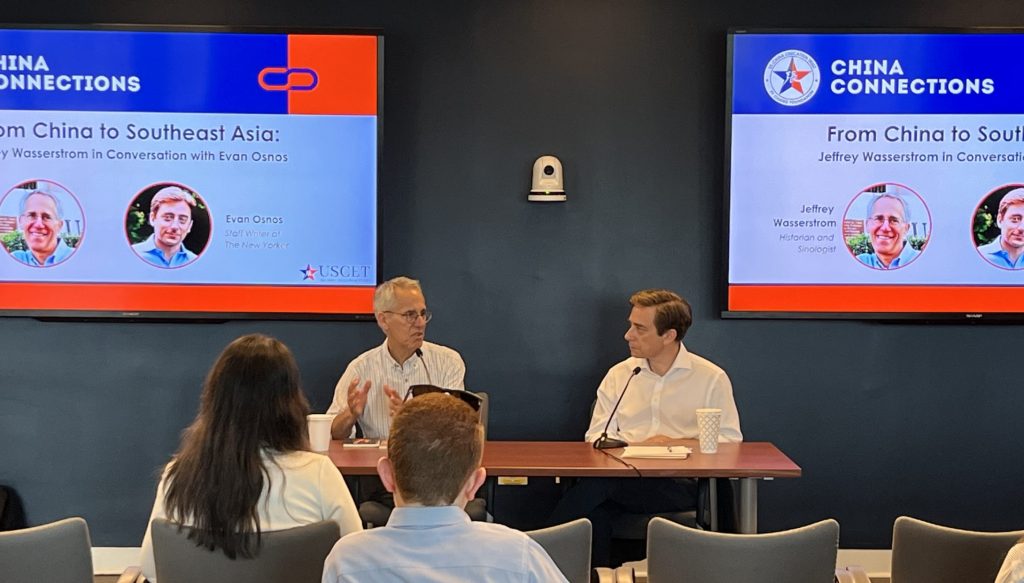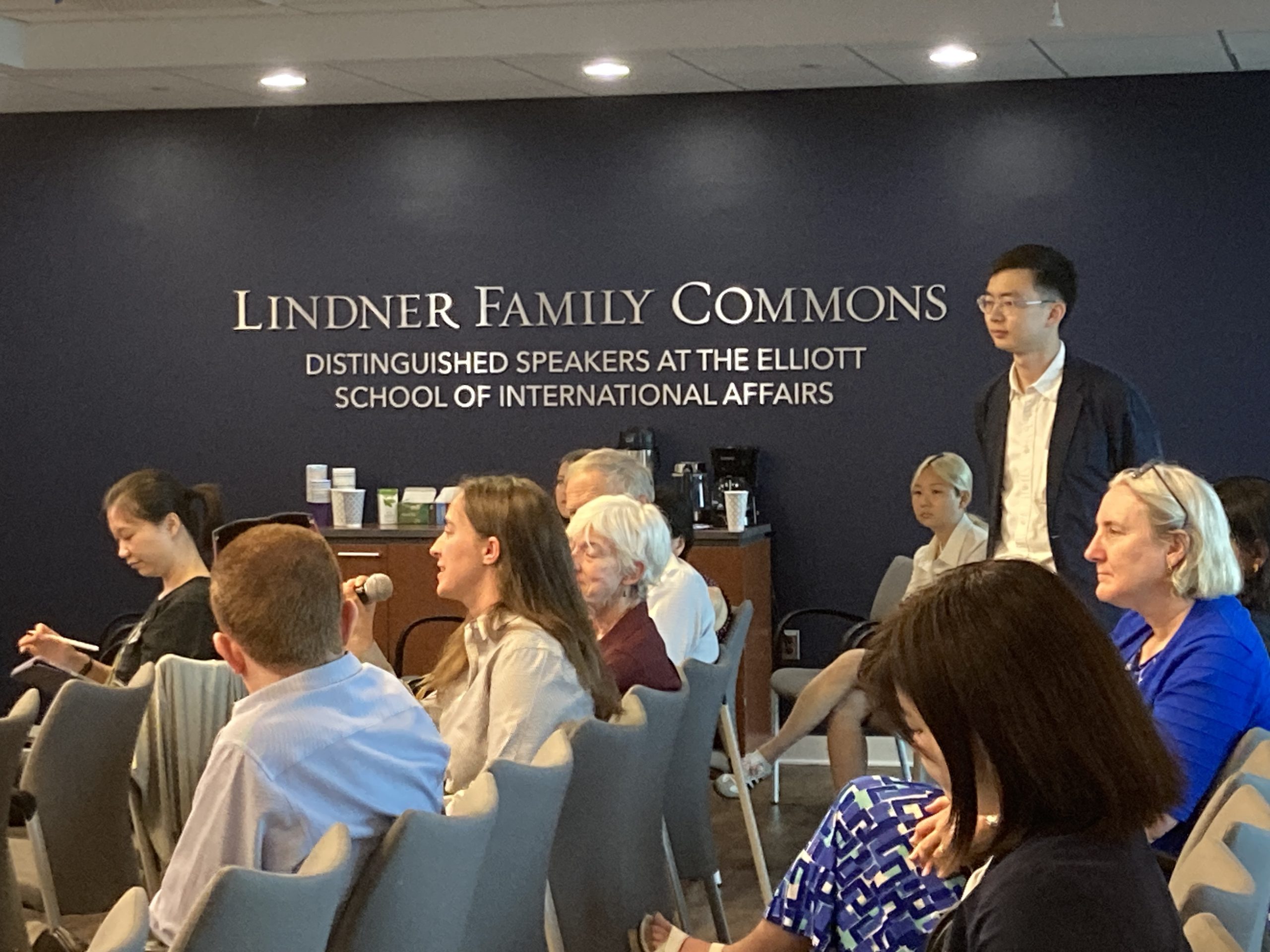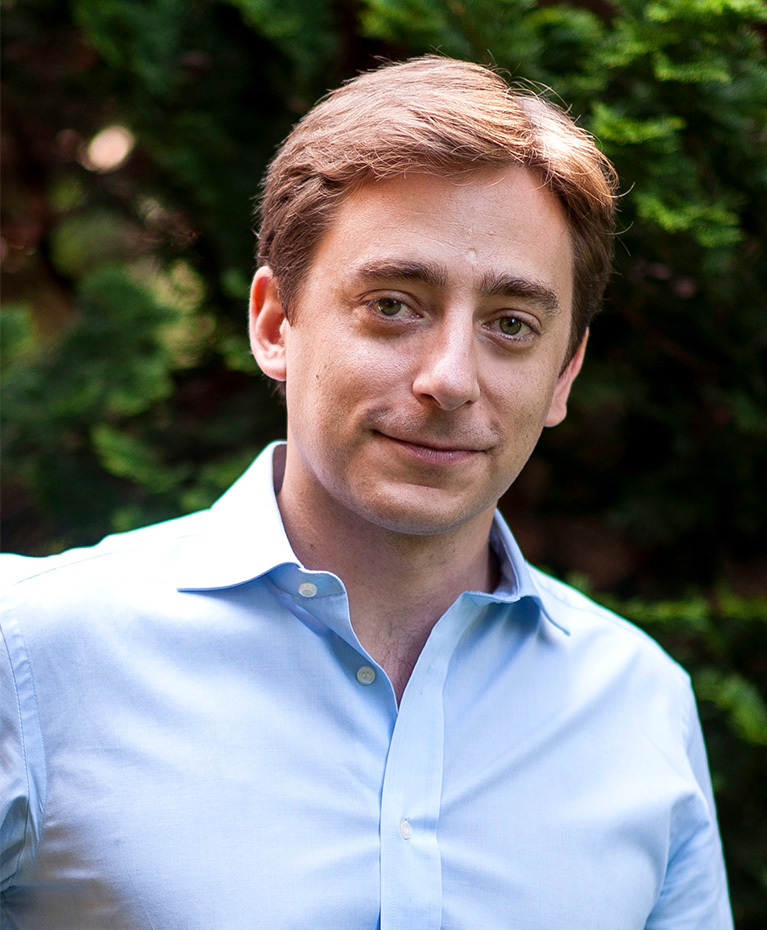On June 16, USCET hosted the latest installment of our China Connection series, “From China to Southeast Asia: Jeffrey Wasserstrom in Conversation with Evan Osnos.” This event brought together historian Jeffrey Wasserstrom and The New Yorker’s Evan Osnos for a dynamic dialogue on protest, history, and the evolving landscape of reporting on China.
The conversation featured Wasserstrom’s latest work, The Milk Tea Alliance, which examines the shared struggles and solidarity among activists in Thailand, Hong Kong, and Myanmar. His work highlights the transnational ties shaping resistance movements across Asia.
USCET’s Executive Director, Rosie Levine, opened the event by framing the conversation around how both speakers bring distinct yet complementary perspectives to understanding and communicating knowledge about China. It was a valuable opportunity for emerging China specialists to learn from seasoned voices who have long studied, reported on, and engaged with the region.

The conversation began with Osnos reflecting on how Wasserstrom’s unique ability to blend the instincts of a journalist with the depth of a historian, engaging younger audiences, and investigating topics that are not yet fully understood. Wasserstrom recounted his early research on the 1946 student protests in Shanghai and how his interest in protest as a historical and social phenomenon evolved through witnessing events like Tiananmen in 1989. He noted that protests, both past and present, are moments of rupture and continuity that reveal broader truths about society.
The speakers discussed how protest tactics and ideas cross borders. From Tiananmen’s global resonance in 1989 to Hong Kong’s influence on Thailand and Myanmar, Wasserstrom highlighted the role of cultural exchange and what he described as a “democracy relay race.” He emphasized that Hong Kong provided new tactics, such as social media coordination, pop culture references, and creative protest strategies, that were later adapted in places like Thailand during the 2020 demonstrations. Osnos added that repression travels too, noting how East Germany learned from China’s surveillance strategies. Together, they underscored a key insight: in both resistance and repression, the flow of ideas transcends national boundaries.
“Tank-man became a symbol of incredible bravery”

Wasserstrom further illustrated this point through his experiences in Bangkok and Myanmar, where he approached unfamiliar contexts with curiosity and humility. He recalled connecting with Thai activists who drew inspiration from the Hong Kong protests, including symbolic acts like visiting the Chinese embassy on PRC National Day while playing “Glory to Hong Kong.”
Drawing from his recent work on inequality in The Haves and Have-Yachts: Dispatches on the Ultrarich, Osnos shifted the conversation to protest in the United States, raising questions about what ignites or stifles public mobilization. Wasserstrom responded by noting the unpredictability of protests and the challenge of knowing when and where a social movement will gain momentum. In the final portion of the conversation, Osnos asked what remains unknown about Xi Jinping and what emerging scholars might explore. Wasserstrom advised looking to the periphery, talking to people adjacent to power and going beyond official rhetoric.
“I think it’s very important for people to study there, and I want them to tell me all the stories about what I’m missing.”
While acknowledging growing constraints on public engagement, especially in Hong Kong, Wasserstrom emphasized the continued importance of approaching China with curiosity and openness. He encouraged young scholars to seek opportunities for direct engagement, as firsthand experience remains invaluable to meaningful understanding.
Speaker Biographies
Speakers

Jeffrey Wasserstrom is Chancellor’s Professor of History at UC Irvine, where he also holds courtesy affiliations in Law and Literary Journalism. He holds a B.A. from UC Santa Cruz, an M.A. from Harvard, and a Ph.D. from UC Berkeley. Wasserstrom has written, coauthored, edited, or coedited more than ten books. His most recent works include Vigil: Hong Kong on the Brink (2020) and the updated third edition of China in the 21st Century: What Everyone Needs to Know (Oxford, 2018), co-authored with Maura Elizabeth Cunningham.
In addition to contributing to academic journals, Wasserstrom writes for general interest outlets such as The New York Times, The Times Literary Supplement, and The Wall Street Journal. He is co-editor of the China Section at the Los Angeles Review of Books. He has served as a consultant for two award-winning documentaries by the Long Bow Film Group and appeared on camera in the film Joshua: Teenager vs. Superpower. He is also a former member of the Board of the National Committee on U.S.-China Relations.

Evan Osnos has been a staff writer at The New Yorker since 2008. From 2008 to 2013, he served as the magazine’s China correspondent, covering stories such as the reconstruction of a train crash that exposed corruption, a group of Chinese tourists on their first trip to Europe, and a barber’s quest to beat the house in Macau. He also wrote the “Letter from China” blog for newyorker.com for four years.
Osnos is the author of Wildland: The Making of America’s Fury, a New York Times bestseller, and Age of Ambition: Chasing Fortune, Truth, and Faith in the New China, which won the National Book Award. Prior to The New Yorker, he was a foreign correspondent for the Chicago Tribune, where he shared in two Pulitzer Prizes.
His upcoming book, The Haves and Have-Yachts: Dispatches on the Ultrarich, will be published in June 2025. He lives with his wife and children near Washington, D.C.
China Connections
Why should Americans be interested in China? USCET launches China Connections, a new monthly series hosting discussions with experts to explore their work, gain insights into current events, and learn what a career in the China field looks like today. These events highlight individuals with unique expertise on China to provide students, young professionals, and members of the public a deeper understanding of current events and increase American student interest in pursuing a focus on China. These events are mostly held in person at George Washington University with online engagement.
